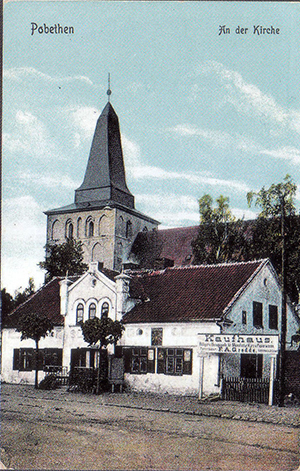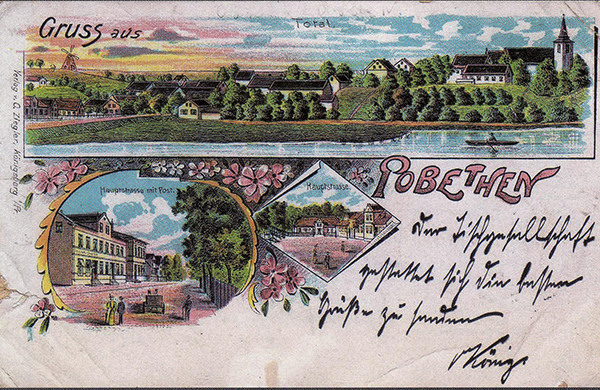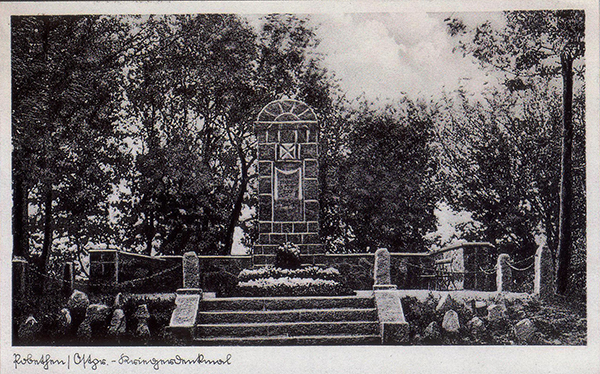Pobetten in old postcards
Pobetten was the most important settlement in Samland after Pillau (Baltiysk) and Fischhausen (Primorsk). The name Pobeti was first mentioned in documents in 1258. Other known names of the place are Pubete (in 1301), Pubetyn (1320), Pobetin, Pubeten (1331), Pobeten, Pobetin (around 1405).
It is located 6 km from the sea and 26 from Königsberg. The Order fortress was built here, possibly to protect against the invasions of Lithuanian tribes, who visited here in 1283 and 1289. The castle stood on the site where the cemetery of the Romanovo settlement is now located. It is assumed that there were defensive fortifications on Chicken Hill, located in the valley of the Mill Creek, in the direction of the Divens farm. It is known that the peasants of Pobetten were distinguished by their freedom-loving nature and were reluctant to submit to the Prussian knighthood. And people appeared in these places already in the Bronze Age.

The famous Pobetten church was built of fieldstone, "almost without bricks", in the second half of the 14th century, and in the following century the bell tower was completed, which also served as a watchtower. A little later, a rich altar and a beautiful organ appeared, and then bells. The name of the place takes us back to ancient Prussian times, to the land of Bethen, when life was limited to small fortified settlements. In 1260, a decisive battle took place near Pobetten between the rebellious inhabitants and the army of Livonian crusaders called to help by Königsberg, and the rebellion was put to an end.
From 1540 to 1575, Pastor Abel Bill served here as rector. Duke Albrecht commissioned him to translate Martin Luther's small catechism "Enchiridion" into Prussian, and it was largely thanks to this that the Prussian language was preserved for posterity - the translation was printed in Königsberg in 1561.
"Everyone who is of the truth hears my voice," says the Gospel of John (Chapter 18, Verse 37). The church had three bells - large, medium and small. The large one was cast in 1835 and weighed 15 centners (a German centner is approximately 50 kilograms, meaning the bell weighed three quarters of a ton). The medium one was made a century later, in 1934, and weighed 8 centners (400 kg). It was cast to replace the one that was melted down during the First World War. The small one was also not small - 3.5 centners (about 175 kg).
In 1535, the local economic administration was transferred to Grünhoff. It is also known that before 1583, the Pobetten pastor received a generous gift, so rich that the saying was born: no priest will die of hunger in Pobetten. A brief intersection with Russian history: Pastor Christian Tege served as a regimental priest in the Russian army during the Seven Years' War (1756-1763). It is known that he took part in the battle of 1758 near Zorndorf (now Sarbinowo, Poland). And then, during the brief period of East Prussia under the Russian crown, he received a "bread" parish in Pobetten as a reward for his efforts.
The future kings Friedrich Wilhelm IV and Wilhelm I, when they were princes, valued the local landscape and came here for vacations. For some time, the Royal Corner, which has not survived to this day, was a reminder of their stay.

The beautiful legend of the drummer from Pobetten lives on in the 21st century. The saga also mentions his drum and sabre, which were kept at the entrance to the village church until 1945. During the war with Sweden, a soldier from Pobetten was captured and taken to Sweden. He worked well and was soon given permission to move freely, but with orders not to leave Sweden. But he was still homesick, and one day, faking his own death, he put on a hidden soldier's uniform, grabbed the sabre and regimental drum he had saved, and managed to swim across the Baltic Sea on an ice floe! The ice floe moored near Rantau (now Zaostrovye), and there, along paths familiar from childhood... The old soldier soon died, but he found peace in his native land, not in a foreign land.
The village had a place for children to play. From the book by Oskar Schlicht (Schlicht O. Das westlische Samland. Ein Heimatbuch des Kreises Fischhausen. — Dresden, 1922): a fairly large plot of land near the castle belonged to the school council and there children and young people could play, spend their free time, and the villagers held meetings and gatherings. In 1912, the local community dismantled the remains of the castle in order to pave the roads with the resulting stone. Only thanks to the intervention of people who cared about the history of the region, a small part of the foundation of the eastern part of the building was saved, it was covered with sand again.
At the beginning of the Dievens valley there was an order mill, later this mill farm came into the possession of the Prussian nobility. Here at the beginning of the 20th century, work began on street lighting of the village. Pobetten has long been an important crossroads between Cranz and Rauschen, as well as on the route from Königsberg to Neukuhren. The nearest stations of the Samland Railway were in the north in Rantau, and to the south - the farm Watzum.
In 1939, the village had 1,358 residents. Laymen from 34 surrounding settlements, with over 5,000 residents, attended services at the local evangelical church. For comparison, there were exactly the same number of citizens in Kranz at the time. Trades and crafts developed in the village. On February 14, 1945, the village was captured by the Soviet Army. Many Pobetten residents continued to stay here for a long time, right up until 1949; Walter Fischer from Voitnikken was the last to leave his homeland. A site plan made in the same year 1945 by the architect Georg Pultke for the village, which was now called Romanovo, has been preserved.

